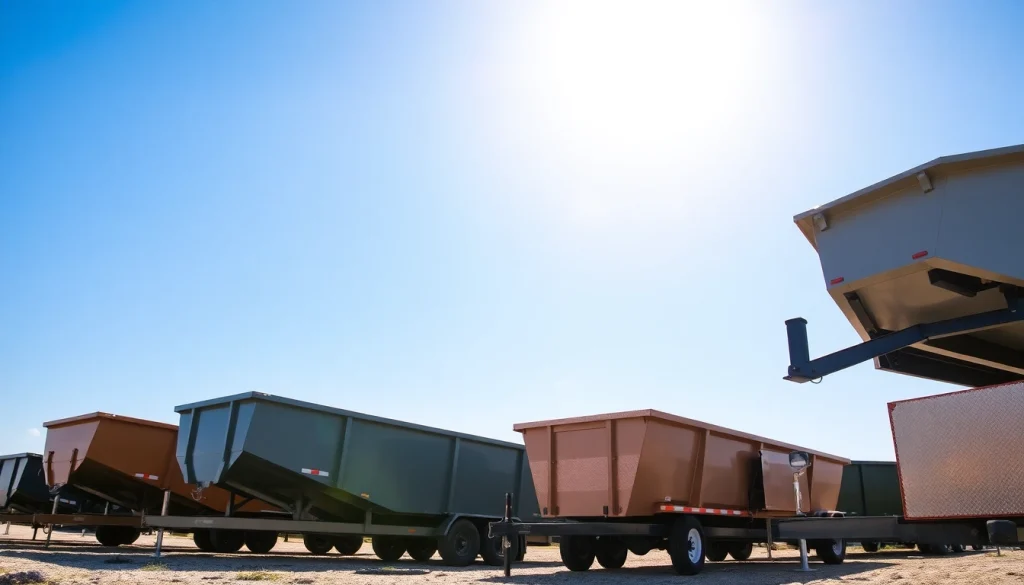Understanding Dumpster Trailers
What is a Dumpster Trailer?
A dumpster trailer is a specialized type of trailer designed to transport bulk materials, primarily construction debris, junk, and other waste items. These trailers are often equipped with a hydraulic lift for easy dumping; they vary in size, weight capacity, and features to accommodate specific hauling requirements. Unlike standard utility trailers, dumpster trailers have their unique aspects that make them particularly suited for hauling waste efficiently. They come in various sizes, ranging from small models that can carry a few tons to larger units designed for heavy-duty loads.
Benefits of Using Dumpster Trailers
Utilizing dumpster trailers provides numerous advantages:
- Efficiency: With hydraulic systems, users can unload debris quickly and easily, saving time on job sites.
- Versatility: Designed for various waste types, these trailers can haul everything from construction debris to yard waste and household items.
- Cost-Effectiveness: Renting or buying a dumpster trailer can significantly reduce disposal costs compared to paying for dumpster service repeatedly.
- Durability: Most dumpster trailers are built from heavy-duty materials, ensuring longevity and reliability even under tough working conditions.
Types of Dumpster Trailers Available
When searching for dumpster trailers for sale, you’ll encounter several types, including:
- Standard Dump Trailers: Commonly used for construction sites, these trailers have a standard open top and come in various sizes.
- Gooseneck Dump Trailers: These trailers are hitch-mounted and allow for better maneuverability and stability when towing larger loads.
- Roll-Off Trailers: Designed for quick loading and unloading, these trailers have a flatbed structure that allows for easy roll-off of containers.
- Heavy-Duty Dump Trailers: For extreme loads, these trailers feature reinforced structures and heavier axles.
Factors to Consider When Buying Dumpster Trailers
Weight Capacity and Size
Before purchasing a dumpster trailer, it is essential to determine the weight capacity you require. This will depend on the types of materials you frequently haul and the trailer’s size. Trailer capacities can range from 5,000 to over 20,000 pounds, so assessing the expected loads is crucial. Choosing the right size ensures that you can transport materials safely without overloading the trailer, which can lead to safety hazards and potential fines.
Material and Build Quality
The material and construction quality of a dumpster trailer are critical for durability and performance. Look for trailers made from high-quality steel or aluminum. A well-built frame will endure wear over time, particularly when handling heavy and harsh materials. Check for reinforced components, such as thick sidewalls and robust axles, which contribute to the trailer’s lifespan and operational capacity.
Pricing Trends and Budget Planning
Investing in a dumpster trailer requires careful budget planning. Prices can vary significantly based on size, build quality, and brand reputation. New trailers typically range from $3,000 to $15,000 or more, while used trailers can be found for considerably less, depending on their condition and age. Monitoring industry trends can also help you find the best time to buy. Many retailers offer promotional deals, particularly towards the end of the year or during trade shows.
Where to Find Dumpster Trailers for Sale
Online Marketplaces
The internet has made it easier than ever to locate dumpster trailers for sale. Online marketplaces like Craigslist, eBay, and dedicated trailer websites provide a wide array of options. Users can filter results by location, price, and condition, making the search process efficient. Additionally, many dealerships offer online inventory, allowing prospective buyers to review available options before visiting in person.
Local Dealers and Sales Events
Local trailer dealers often have a selection of new and used dumpster trailers. Visiting these locations allows buyers to inspect trailers firsthand, providing an opportunity to assess quality and features. It’s also beneficial to attend local trade shows or expos, where many dealers display their offerings and often provide special promotional pricing or financing options.
Comparing Prices and Features Across Vendors
Once you have a shortlist of potential dumpster trailers, comparing prices and features is essential. Pay attention to essential specifications such as weight capacity, material quality, towing requirements, warranty options, and additional features like hydraulic lifts or ramps. Don’t hesitate to negotiate with vendors, especially if you find similar trailers at lower prices elsewhere.
Tips for First-Time Buyers of Dumpster Trailers
Choosing the Right Trailer for Your Needs
First-time buyers should take the time to assess their specific hauling needs before making a purchase. Consider factors such as load types, frequency of use, and towing vehicle capabilities. Creating a list of necessary features, like a hydraulic lift or rebound technology for smooth dumping, will help clarify options when selecting a trailer that fits your lifestyle and business operations.
Inspecting Features and Specifications
When physically inspecting dumpster trailers, examine the following:
- Hitch Compatibility: Ensure that your towing vehicle can safely and legally tow the trailer.
- Suspension System: Opt for trailers with quality suspension for a smoother towing experience that reduces wear and tear on your vehicle.
- Total Weight: Consider the unladen weight of the trailer and whether it falls within the towing capacity of your vehicle.
- Warranty and Service Options: Check manufacturer warranties and service agreements so you’re covered in case of future issues.
Understanding Warranty and After-Sales Support
Understanding the warranty and after-sales support options available is crucial for any significant investment. Solid warranties can often indicate a company’s commitment to quality. Additionally, finding a manufacturer or dealer that offers reliable after-sales support gives buyers peace of mind, ensuring that maintenance and repair services are readily accessible.
Maximizing the Use of Your Dumpster Trailer
Best Practices for Loading and Transporting
To maximize efficiency while using a dumpster trailer, follow these best practices:
- Weight Distribution: Always load heavier materials at the bottom and evenly distribute weight to maintain trailer stability.
- Secure Loads: Utilize tie-downs to secure materials, minimizing potential hazards while transporting.
- Follow Local Regulations: Be sure to comply with local rules regarding load limits and additional permits that may be required for larger units.
Maintenance Tips for Longevity
Regular maintenance extends the lifespan of your dumpster trailer. Here are some important tips:
- Brake Inspection: Regularly check the brakes for wear and tear, replacing them as needed for safe operation.
- Check Tires: Monitor tire pressure and tread for wear; replace tires that show signs of damage.
- Clean the Trailer: Periodically wash the trailer to prevent rust and keep it looking new. Special attention should be given to hydraulic systems to ensure they operate correctly.
Common Uses and Versatility of Dumpster Trailers
Dump trailers are versatile and can serve multiple purposes across various industries. Common uses include:
- Construction and Renovation: Ideal for transporting debris from job sites, making clean-up fast and efficient.
- Landscaping: Landowners and landscaping businesses benefit from dumpster trailers for removing yard waste and transporting materials like mulch and soil.
- Residential Cleanouts: Homeowners can use them for junk removal during renovations or general cleaning projects, making them a convenient solution for managing waste.
- Moving and Storage: Some individuals utilize trailers to transport large items or for temporary storage during moves.



